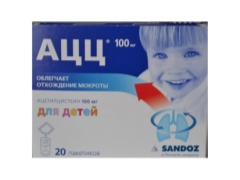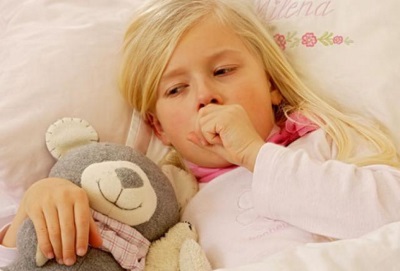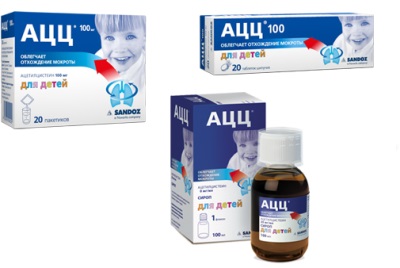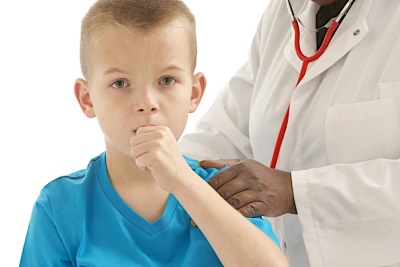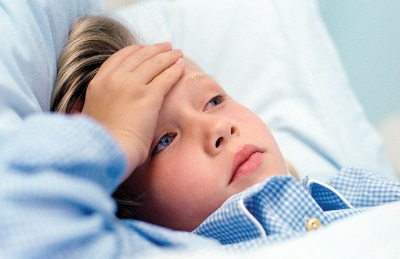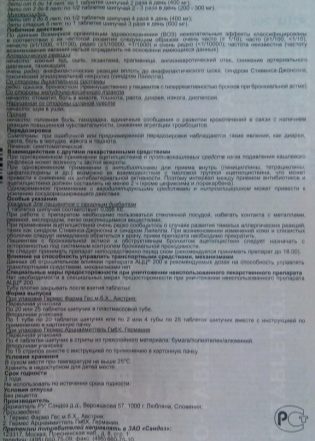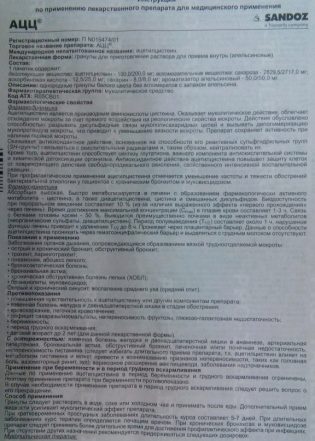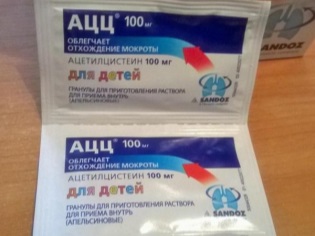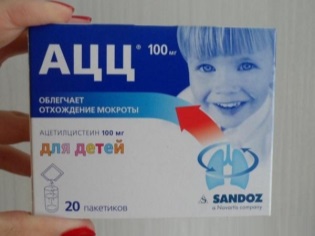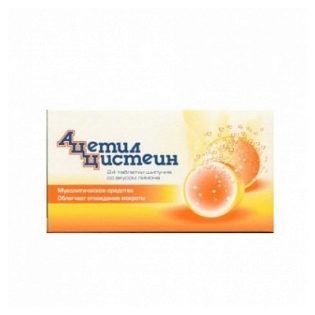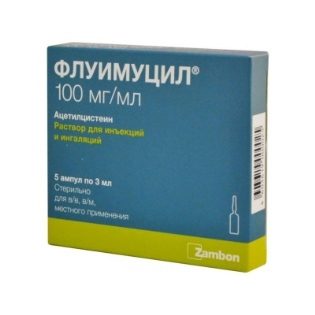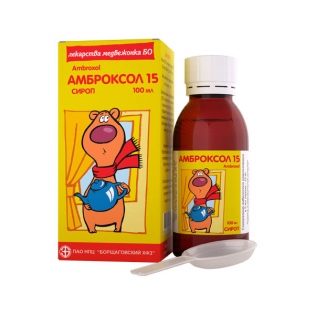Powder "ATsTs 100" for children: instructions for use
Cough in a child bothers any mother and causes the desire to immediately help the baby. In the fight against this symptom, mucolytic agents are often used to help make viscous sputum more liquid. Among these remedies, the drug from Sandoz under the name ACC 100 is very popular. Can I take it to children and how does the children's body react to this drug? At what dose and how many times do you need to give ACC to a child with a cough?
Release form
ACC 100 is available in three versions:
- Effervescent tablets. They are packaged in tubes (in one there are 20 pieces) and are round flat tablets that have the smell of blackberry and white color. After dissolving such a tablet, a clear, colorless liquid is formed that smells like blackberries. Let's say a slight smell of sulfur.
- Pellets from which the solution is prepared (it is given to the child to drink). They are white and homogeneous, smell of orange and packaged in 3 gram packages. One pack contains 20 sachets. After mixing the granules in water, an orange drink is obtained.
- Syrup. The content of the active substance in this form of ACC is 100 mg per 5 ml of syrup. The medicine is a slightly viscous, clear, colorless liquid with a cherry smell. It is placed in a 100 ml glass dark bottle.
Composition
The active ingredient in the drug ACC 100 is acetylcysteine. Its content, as can be understood from the name of the drug, is 100 mg in each package or in one effervescent tablet. Additional ingredients are:
- In effervescent tablets - Na carbonate, Na saccharinate, ascorbic acid, Na citrate, citric acid, lactose, Na bicarbonate, mannitol, blackberry flavor.
- In granules - saccharin, vitamin C, sucrose, orange flavor.
- In syrup - saccharinate Na, water, Na benzoate, Na hydroxide, edetate disodium, methyl parahydroxybenzoate, Carmellose Na, cherry flavoring.
Operating principle
Acetylcysteine contained in ACC 100 has a mucolytic effect. Such a connection directly affects sputum, which is produced in the respiratory tract, with the result that the rheological characteristics of mucus change. The drug destroys the connection present in the secret of mucopolysaccharides, which leads to a decrease in the viscosity of sputum. It is noted that the medicine actively dilutes mucus, even when there is pus in the bronchi.
Acetylcysteine also has an antioxidant effect. This substance activates the production of glutathione and neutralizes the radicals arising from oxidative reactions. As a result, the drug activates the protection of cells of the respiratory tract and reduces the severity of inflammation.
Promotional video of the drug ACC:
Indications
The reason for prescribing ADC 100 is the presence of an overly viscous secretion in the bronchi, which needs to be diluted and removed from the respiratory tract.
The drug is in demand for such problems:
- Laryngitis.
- Bronchitis.
- Pneumonia.
- Laryngotracheitis.
- Bronchiolitis.
- Chronic pulmonary diseases, including obstruction.
- Otitis media
- Sinusitis.
- Bronchiectasis.
- Lung abscess.
- Cystic fibrosis.
You may be interested to see the release of Dr. Komarovsky’s program, which addresses such a hot topic as coughing in children:
At what age is it allowed to take?
The use of ACC 100 is recommended for children who have already turned 2 years old. Higher dosage forms are prescribed for older children - ACC 200 from 6 years old as well ACC Long since 14 years old.
Contraindications
Reception ATsTs 100 is not recommended:
- When intolerance to acetylcysteine or another component of the drug, for example, lactose in effervescent tablets.
- When detected in the sputum of blood impurities.
- When glucose-galactose malabsorption.
- If bleeding is detected in the lung.
- With peptic ulcer disease, which has worsened.
- With a deficiency of sucrase or lactase (for the form in which sucrose or lactose is present).
Assign ACC 100 for bronchial asthma, renal disease, diseases of the adrenal glands, diabetes, high blood pressure, or liver disease should be a doctor with special attention.
Side effects
- Acceptance of the ACC 100 may cause allergic reaction for example, itching, hives, skin rashes or swelling. Occasionally the drug provokes anaphylaxis.
- The respiratory tract of the child may respond to the treatment of ACC 100 the appearance of shortness of breath. If the baby has asthma, the medicine can cause bronchospasm.
- The digestive system of some children "responds" to the use of ACC 100 dyspeptic disorderfor example, liquefied stools, abdominal pain or heartburn.
- Rare side effects of acetylcysteine treatment are tinnitus, fever, headache, bleeding.
Instructions for use and dosage
ACC 100 is recommended to be taken after meals. The required number of tablets is dissolved in one glass of water and then immediately drunk. To prepare a therapeutic solution is advised only in glassware. If you dilute the drug with water, it can be stored in liquid form for no longer than 2 hours.
Not only water can be used to dissolve the granules, but also non-hot tea or juice. Syrup is metered using the supplied syringe or measuring cup. It is not recommended to give medicine later than 6 pm, so as not to disturb the sleep of the child. For greater therapeutic effect, it is recommended to give children more drink.
The dose of the drug is determined based on the age of the small patient:
- If the child is under 6 years old, then per day he is given from 200 to 300 mg of acetylcysteine. This amount is divided into 2 doses, because a single dosage will be 1-1.5 tablets or 1-1.5 packets of granules. If the drug is given in syrup, then a single dose at the age of 2-5 years will be 5 or 7.5 ml.
- Children over 6 years old to 14 years old with300-400 mg is the weighting amount of acetylcysteine for therapeutic effect. Since the drug is taken twice a day, then a single dose will be 150-200 mg, which corresponds to 1.5-2 effervescent tablets ACC 100, 7.5-10 ml of syrup or 1.5-2 bags of granules ACC 100. It turns out that from the age of six it is more convenient to use the ACC 200.
- Child is 14 years old and older per day give from 400 to 600 mg of acetylcysteine. The drug is taken from 1 to 3 times a day, so more demand drugs ACC 200 and ACC long.
The duration of treatment is determined by the doctor individually, but acute pathology is often treated for 5 or 7 days.
Overdose
If a child takes ACC in too high a dose, it will cause nausea, diarrhea, or vomiting. Symptomatic therapy is used to help in this situation.
Interaction with other drugs
- Diluting granules or tablets ACC 100 in a glass, along with any other drugs should not be.
- If the child is given activated carbon or another sorbent, the effectiveness of the treatment of ACC 100 will decrease.
- The simultaneous use of ACC 100 and antitussives is prohibited, since after inhibition of the cough reflex, the mucolytic action of acetylcysteine provokes the stagnation of sputum.
- Having added bronchodilators to treatment of ACC 100, the effectiveness of therapy will increase.
- ACC 100 may interfere with the antimicrobial action of certain antibiotics, for example, penicillin or cephalosporin drugs. Between taking such drugs is required to withstand a pause of at least 2 hours.
- If the patient is given ACC 100 and any vasodilating agents, the vessels will expand more.
Terms of sale
To buy ACC 100 in a pharmacy, a doctor's prescription is not needed. The average price of a package of effervescent tablets or syrup is 240 rubles, and you need to pay about 120 rubles for a pack of 20 sachets.
Storage conditions and shelf life
Storage temperature tablets and granules should not be more than + 25 ° C. The tube is kept in a dry place and after each extraction the tablets are tightly closed. The shelf life of this form is 3 years.
Store ATC syrup away from the rays of the sun and moisture. From the time of issue, the closed bottle can be stored for 2 years, and after opening, the medicine should be used within 18 days. Granules ACC 100 have a shelf life of 4 years.
Reviews
The drug ACC 100 receives mostly good reviews from parents. Mothers who treated this medicine for their children with cough note that the remedy is effective enough and side effects are rarely detected. They confirm that taking AC 100 facilitated the removal of mucus from the respiratory tract and accelerated the healing process. The taste of the drink made from the ACC 100, according to reviews of moms, most kids like.
Analogs
Replacing the ACP 100 can be analogues that have the same active substance, for example:
- Fluimucil. Such medicine is released in an ingestible solution (contains 20 or 40 mg of acetylcysteine per 1 ml of the preparation), in solution for injections and inhalations, in granules (1 packet contains 200 mg of acetylcysteine) and in the form of effervescent tablets with the dosage of the active substance 600 mg.
- Acetylcysteine. This domestic product is produced in effervescent tablets containing 200 mg of the active substance, as well as in the powder from which an oral solution is prepared (100 or 200 mg of acetylcysteine can be contained in a package).
- Acetin. The tool is available in tablets and effervescent tablets of 200 and 600 mg of acetylcysteine.
- N-AC-Ratiopharm. The drug is represented by effervescent tablets of 200 or 600 mg of the active substance, as well as sachets with powder, from which a solution is prepared with an acetylcysteine content in the dosage of 100, 200 or 600 mg.
In addition, instead of ACC 100, you can give other drugs that have a mucolytic effect. Such drugs include products that contain Ambroxol or carbocysteine.
The mechanism of action of the ACC is clearly shown in the advertisement of the drug.
